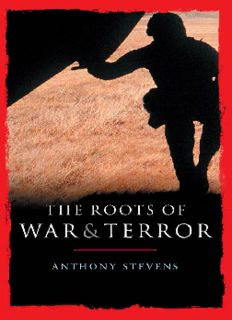
Roots of War and Terror PDF
Preview Roots of War and Terror
The Roots of War and Terror Also by Anthony Stevens On Jung The Two Million-Year-Old Self Jung Private Myths: Dreams and Dreaming Ariadne's Clue: A Guide to the Symbols of Humankind An Intelligent Person's Guide to Psychotherapy With John Price Evolutionary Psychiatry: A New Beginning Prophets, Cults and Madness Website www.anthonystevens.co. uk The Roots of War and Terror Anthony Stevens continuum LONDON • NEW YORK CONTINUUM The Tower Building, 15 East 26th Street, 11 York Road, New York, London SE1 7NX NY 10010 www. con tin u um books, com © Anthony Stevens, 2004 All rights reserved. No part of this publication may be reproduced or transmitted in any form or by any means, electronic or mechanical, including photocopying, recording or any information storage or retrieval system, without prior permission from the publishers. First published 2004 British Library Cataloguing-in-Publication Data A catalogue record for this book is available from the British Library. ISBN 0-8264-7108-0 Typeset by BookEns Ltd, Royston, Herts. Printed and bound in Great Britain by Cromwell Press Ltd, Trowbridge, Wilts Contents Acknowledgementss vii 1 WAR AND PEACE 1 2 US VS THEM 28 3 BASIC WAR 58 4 MAKING WARRIORS 85 5 MAKING LOVE 117 6 MAKING WAR 137 7 MAKING PEACE 174 8 TRANSCENDING WAR 212 Glossary 243 Referencess 249 Index 257 This page intentionally left blank Acknowledgements I should like to thank the authors and publishers for permission to quote from the following publications: Erik Erikson's 'Reflections on Ethos and War' (in The Yale Review, Yale University Press, New Haven, CT); J. Glenn Gray's The Warriors: Reflections on Men in Battle (University of Nebraska Press, 1998, originally published in 1959 by Harcourt, Brace, New York); John Hockey's Squaddies: Portrait of a Subculture (Exeter University Publications, Exeter); The Collected Works of C.G.Jung, edited by Herbert Read, Michael Fordham, and Gerhard Adler (Brunner-Routledge, London and Princeton University Press, Princeton, NJ). I should also like to put on record my gratitude to the late Field Marshal Lord Carver for his guidance and for permission to quote remarks made by him during our discussion on 19 February 1985. My special thanks are due to Dr Tom Kirsch and the Trustees of the C.G. Jung Foundation for Analytical Psychology, New York, for inviting me to give the C.G.Jung Lectures, 1985, when I began developing the ideas presented in this book. In the course of conducting seminars in Europe and the United States on the archetypal foundations of war and peace I have learned much, and I am grateful to the participants in these seminars as well as my friends - civilian and military - on both sides of the Atlantic, for sharing with me the fruits of their experience and wisdom. vii This page intentionally left blank Chapter 7 War and Peace Jeremy Isaacs: Do you still worry about a nuclear holocaust? Martin Amis: No, the planet is now safe for war. The Late Show, BBC 2, 10 October 1993 Had I conducted an opinion poll among my readers just before the Berlin Wall came down in 1989 concerning their attitudes to war, it would have revealed virtual unanimity concerning one thing: they would have been against it. Memories of the horror inflicted by two world wars and the Vietnam War, combined with Cold War fears of nuclear annihilation, meant that all intelligent men and women regarded war as a terrible catastrophe and were convinced that everything possible should be done to prevent it. The collapse of the Soviet Union ended the threat of global war, but, in the years that followed, the world witnessed an alarming increase in violent confrontations between different ethnic, national, and religious communities. This changed to some extent our collective willingness to condone the use of armed force by governments as a means of containing such conflicts - a willingness that was considerably enhanced by the events of 11 September 2001. But fears of a full-scale nuclear war have receded. For the time being, there is only one superpower, and no nation is going to engage in a nuclear exchange with the United States of 1
Description: